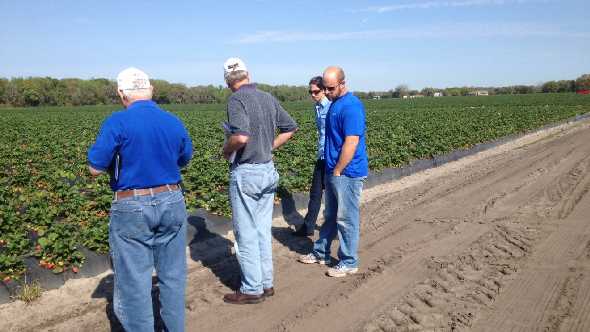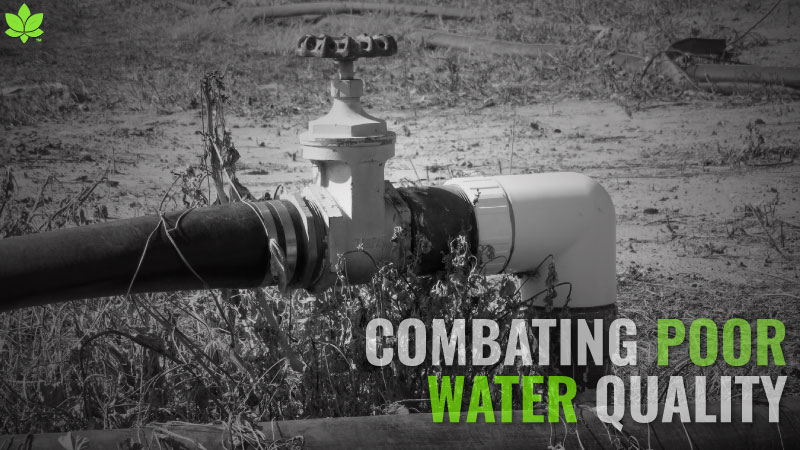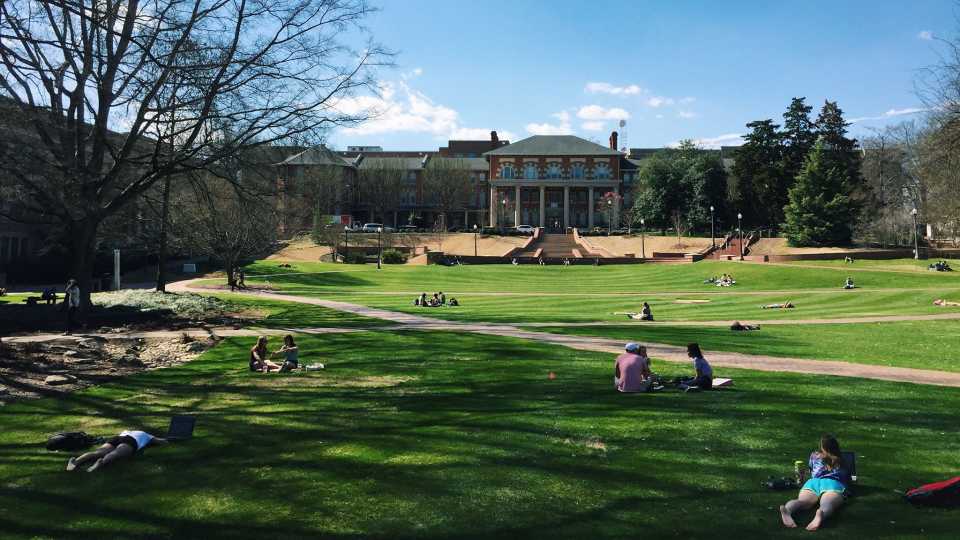Florida BMPs Program Racks Up More Successes
The Florida legislature passed the 1999 Florida Watershed Restoration Act that gives the Florida Department of Agriculture and Consumer Services (FDACS) the authority to develop interim measures, best management practices (BMPs), cost-share incentives, and other technical assistance programs to assist agriculture in protecting our water resources. By definition, BMPs are a practice or combination of practices, based on research, field-testing, and expert review, to be the most effective and practicable on-location means to reduce potential nutrient contamination of surface and groundwaters. The BMPs include economic and technological considerations growers can implement with minimum impact of production.
Educational programs were provided to growers covering topics including irrigation efficiencies, nutrient application and efficiencies, conservation techniques, etc.
A website (bmp.ifas.ufl.edu) also has been improved to provide meeting schedules, presentations, published works, and other information to allow growers to make informed choices.
UF/IFAS research has demonstrated that water and fertilizer management are inextricably linked. Changes in one will almost inevitably affect the efficiency of the other. The goal of proper water management is to keep both the irrigation water and the fertilizer in the root zone. Fertilizer and the energy to run irrigation systems are significant costs of production and through education growers are learning that besides benefitting the environment, the adoption of BMPs can contribute significant savings to their operations while maintaining high yields.
The following reports illustrate the impact and successes of UF/IFAS Extension agent programs.
Reported By Crystal Snodgrass, UF/IFAS Extension Agent in Manatee Co. — Center-Pivot Irrigation Trials and Grower Field Day:
Seepage irrigation is the most commonly used irrigation method for both potato and snap bean production in Florida. However, seepage irrigation is much less efficient in water use than other methods. In a partnership with Southwest Florida Water Management District (SWFWMD), a three-year study is being conducted using center pivot irrigation in four locations growing snap beans and potato in Manatee County. In spring 2014, a grower field day demonstration was conducted at one of the trial sites in which 25 local growers were able to see the trial results firsthand. The program was conducted in collaboration with UF/IFAS specialists, the SWFWMD/Facilitating Agricultural Resource Management Systems (FARMS) program, and a Manatee County potato and snap bean producer.
Initial studies have shown that on average, center-pivot uses 40% to 60% less water than seepage saving approximately 345,000 gallons per acre in potato and 88,000 gallons per acre in snap beans.
Manatee County grows approximately 2,500 acres of potato and 1,500 acres of snap beans annually. If all of the acreage was converted to center-pivot, an overall savings of more than 860 million gallons in potato and 132 million gallons of water in snap beans could be realized.
Twenty five participants attended the potato and snap bean field day on March 26, 2014. Of the participants, 72% showed interest in converting their operations to center pivot irrigation as indicated by a verbal survey. Education of Manatee County potato and snap bean producers and potential center-pivot conversion would not only save water, but also help to maintain water quality, a precious resource for both stakeholders and citizens.

Photo by UF/IFAS
Reported By Jemy West Hinton, UF/IFAS BMP Implementation Agent — Conversion Of Citrus Grove To Strawberry Production:
Dennis Carlton is a longtime rancher and citrus producer in West-Central Florida. As with most Florida citrus, the home grove became infected with citrus greening and the trees had to be pushed out. Carlton contacted the USDA Natural Resource Conservation Service to assist with a conservation plan to convert the citrus grove to a strawberry farm. After the plan was issued, SWFWMD FARMS assisted with a cost-share project to install a surface water system for growing strawberries and vegetables that will save a significant amount of water withdrawal from the aquifer.
This project will involve the use of an existing 43-acre reservoir (created as a result of historical peat mining) to offset Upper Floridan aquifer groundwater used for bed preparation, crop establishment, supplemental irrigation, and cold protection of more than 80.6 acres of strawberries.
The surface water offset from this project will reduce groundwater annual average use by 69,900 gallons per day and frost/freeze groundwater use by 1,361,800 gallons. FARMS cost-share project components consist of one surface water irrigation pump station, filtration system, and the piping necessary to connect the surface water reservoir to the existing irrigation system.
As access to groundwater becomes more competitive, farmers are looking to implement projects such as the Dennis Carlton surface-water project to provide adequate irrigation and freeze protection to their crops while protecting the water resources.
Reported By Shawn Steed, Extension Agent In Hillsborough County — Converting Waste into Compost Field Day:
A workshop was held at the Hillsborough County Extension Office to teach nursery growers how to recycle used nursery potting soil. About 10% of all nursery soil is discarded as waste. Usually this is dumped on-site in a pile. Thirty attendees learned two methods to recycle this wasted potting soil back into production; composting being one method and soil solarization being the other.
Attendees also were able to see a soil solarization demonstration plot. A representative of the UF/IFAS Best Management Practices program spoke to the group about signing Notice of Intent to Implement BMPs for nursery growers and the benefits in cost share with NRCS and SWFWMD.
All of evaluation respondents felt that they could improve their operation by reusing potting soil.
Similarly, all respondents improved their level of knowledge about soil composting and soil solarizing after the workshop. Forty seven percent of attendees currently reused old potting soil. All respondents intended to start recycling soil with 26% using composting and 16% using solarization and 37% using both methods.
Some attendees reported how many yards of soil they thought they would recycle. Three attendees reported they would recycle 121 yards annually or a production saving of about $4,235.
A few other attendees reported they could reuse 5% to 10%, 25% to 50%, 90%, and most of their dumped potting soil annually.
Reported By Gene McAvoy, SW Florida Extension Agent And County Director — Southwest Florida Vegetable Research Investment Fund:
The Southwest Florida Vegetable Fund is a strategic partnership of growers and others in the vegetable industry that have come together to pool their resources to address research needs of common concern.
Now moving into its 10th year, growers and industry partners have joined together and contributed more than $250,000 to fund vegetable research in Southwest Florida.
Since its establishment in June 2000, the fund has successfully financed 20 projects in three priority areas: methyl bromide alternatives, water and nutrient management and conservation, and integrated pest management. These projects show that growers investing in research on BMPs to provide improved production practices. The goals of these projects are the future reduction in pollutant potential with sustainable production yields and show growers are casting an eye to the future.
Conclusion
UF/IFAS researchers, specialists, and Extension agents, in cooperation with agricultural producers, continue to evaluate new technologies and management practices which may in the future contribute to the protection of the environment.
The BMPs program is a voluntary, ever-evolving endeavor which, with the continued involvement and dedication of farmers, Extension agents, and scientists, and their efforts to develop new technologies and practices, will continue to protect the waters of Florida from agricultural non-point sources of pollutants.
Jemy Hinton, UF/IFAS BMPs coordinator, also contributed to this article.









